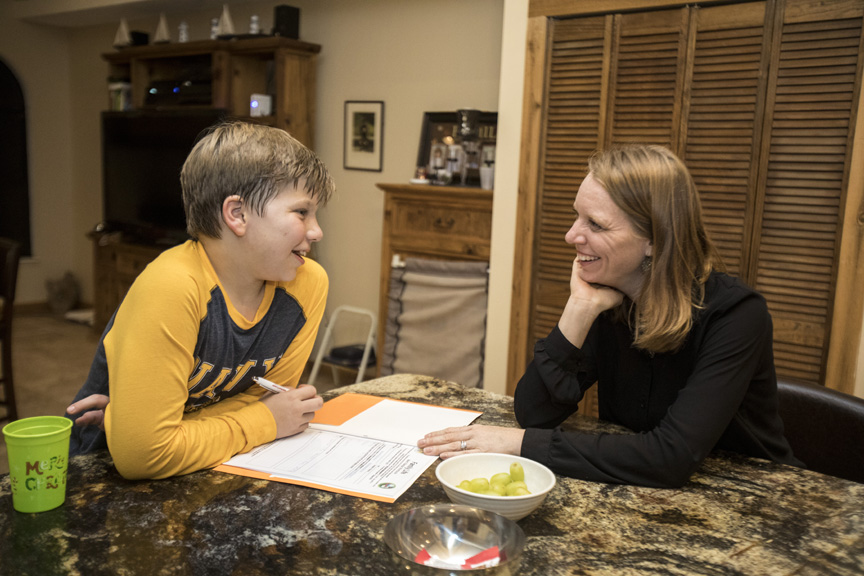- Education
- Parenting
Now you’re the teacher: How to homeschool while shut in

In this article, you’ll find answers to questions like:
1. How to create a schedule?
2. How to be interactive and topical?
3. What about the summer?
Pandemics, hurricanes and other life-altering crises may force caregivers to take on an unexpected role: teacher. Local educators offer their advice here if you find yourself under the pressure of needing to keep your children’s academics on track from home.
1. HOW TO CREATE A SCHEDULE?
Keep your morning schedule normal, says Leslie T. Wilson, an eighth-grade language arts teacher and department chairperson at Carver Middle School in Delray Beach. Wake up at the same time and get dressed. Then follow a new schedule, created just for home.
“If you have a student who struggles with learning, create a strict schedule. If you have an enthusiastic learner, then you can be more flexible,” she says. “But create a schedule for learning, even if it’s just for two or three hours of academics a day.”
Create 30-minute sessions of writing, reading, math and science experiments, Wilson says. Older students should practice typing to prepare for online writing exams. Don't forget to build in time for art, music or outside play, too.
“Try to find joy in and be interested in what they're learning. They will follow your lead,” says Jane Napsky, a west Boynton Beach mother who is a veteran at homeschooling her son.
For students in kindergarten through second grades, the Palm Beach County School District’s online at-home learning resources are helpful, says Tammy Walton, second-grade teacher at Forest Hill Elementary in West Palm Beach. They are designed like games to hold a young student’s attention.
2. HOW TO BE INTERACTIVE AND TOPICAL?
Not all learning has to come from a book or app.
For older students, Wilson recommends incorporating screen-free lessons when possible, such as journaling about their feelings for the writing portion, planting seeds for a garden for science or listening to a different music genre for arts.
Math lessons can take the form of measuring ingredients for meal prep, and reading comprehension can be summarizing information gleaned from media, even though it may be frightening.
“Whatever has you staying at home can absolutely be scary, but it’s scary because students lack information,” she says. “At their appropriate age group, they need to be aware of what’s going on. You can have them create a game or quiz out of the things they learn by listening to the news. Parents can use factual information to address and talk about their child’s fears.”
However, take a break and go easy if your child seems stressed by the news, Napsky says.
3. WHAT ABOUT THE SUMMER?
During summer break, most students spiral into the summer slide when they lose a level in reading. You can combat this by encouraging reading, Walton says.
Additionally, ask your child questions about what they read or ask them to write about it to improve comprehension, which is key. Parents can learn what questions to ask by using the Language Arts Florida Standards listed by grade level.
For math, kindergarteners should practice recognizing numbers; first-graders should work on addition; and second-graders should tackle addition and subtraction. Parents who need more guidance can ask to text the teacher questions.
“I stay in contact with my parents this way quite often,” Walton says.
For more insight and support, reach out to homeschool groups such as Florida Parent Educators Association and Florida Home Educators.
SOURCES:
• Leslie T. Wilson, language arts teacher and department chairperson, Carver Middle School
• Tammy Walton, second-grade teacher, Forest Hill Elementary School
You May Also Like
-
- Behavior
- Education
- Parenting
Why is a strong foundation in reading crucial by third grade?
During early school years, children focus on learning to read. But once children hit third grade, they begin reading to learn. That means if children can’t read well, they will fal …
Read More -
- Behavior
- Education
Listen up! You can help your child focus by reading aloud together
Reading aloud has been hailed as the key factor to long-term success in reading. So here's what to if your children fidget, squirm and daydream their way through storytime. …
Read More -
- Education
- Parenting
- Things to do
BLOG: Try local music programs to boost well-being, academics
Did you know music can soothe a child's mood and improve learning? Read on to discover more surprising benefits of music from our local expert. …
Read More
Related resources
-
- Education
- Parenting
Florida Virtual School
Fully accredited online school for youth who are homeschooled in Florida
800-374-1430 Website -
School District of Palm Beach County
Home Education — information, resources, support and requirements related to homeschooling in Palm Beach County
561-434-8052 Website
